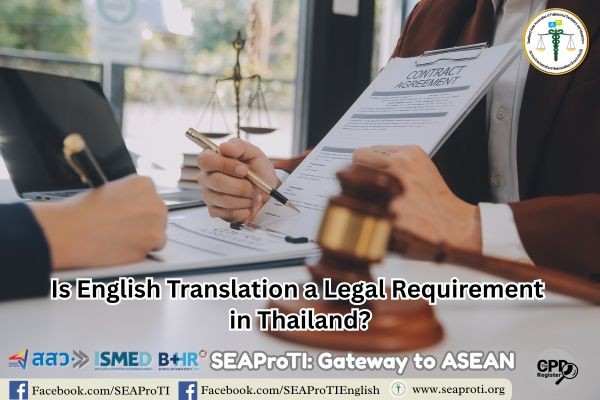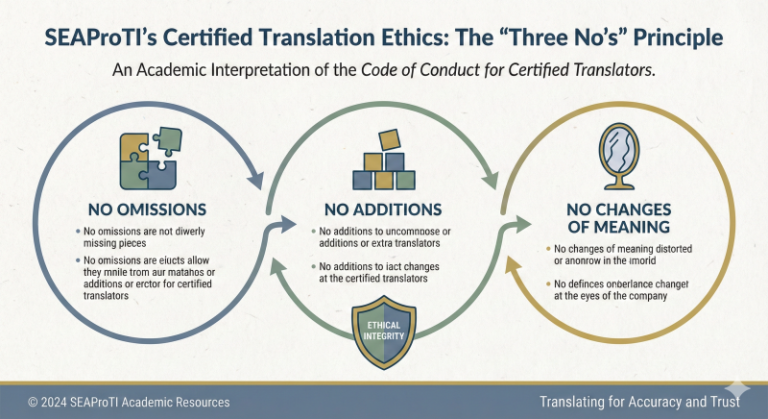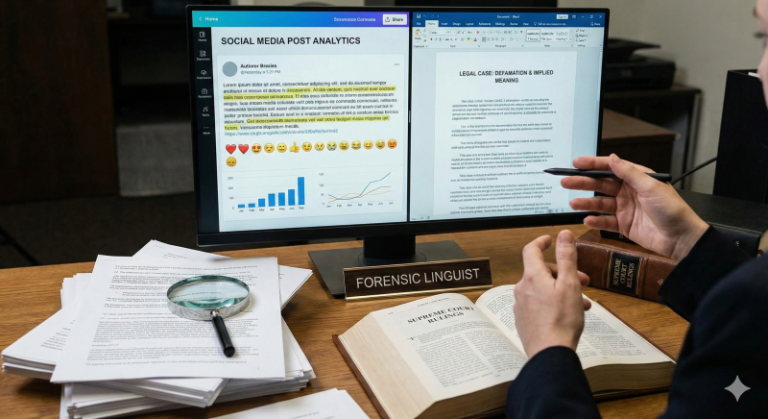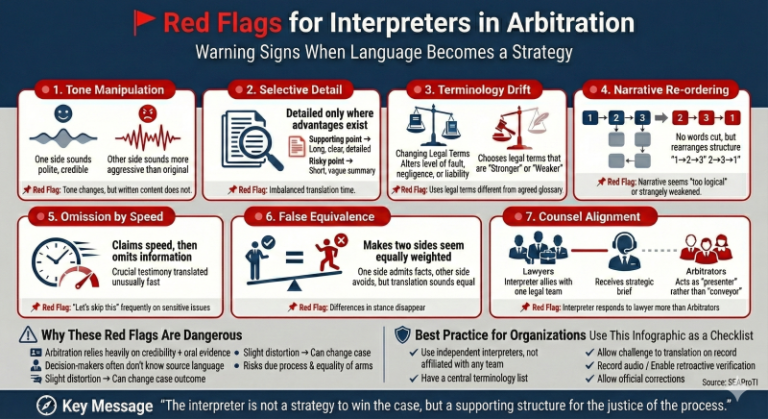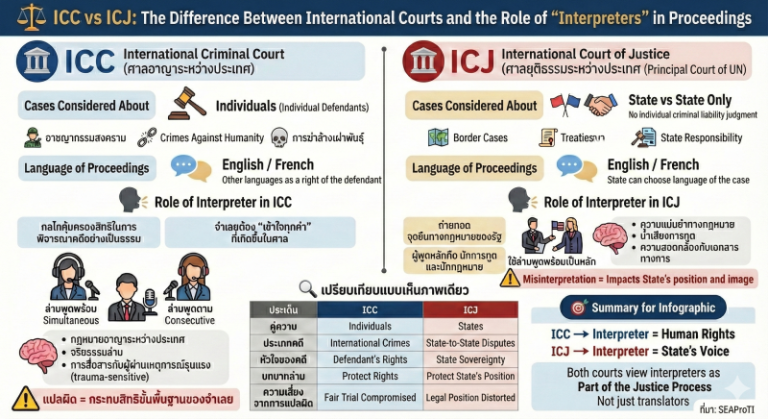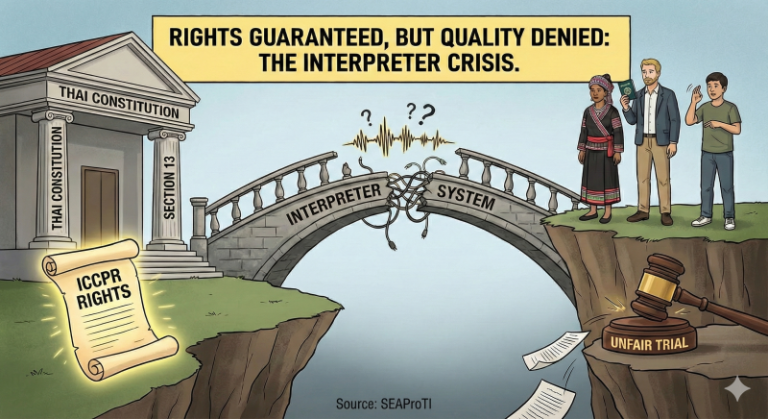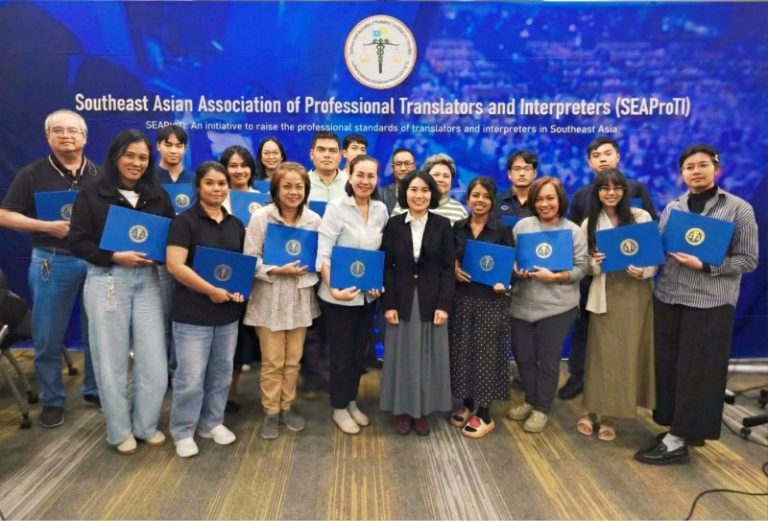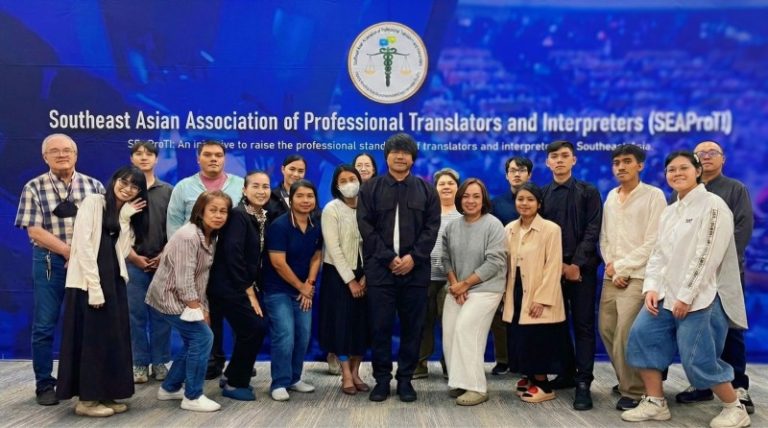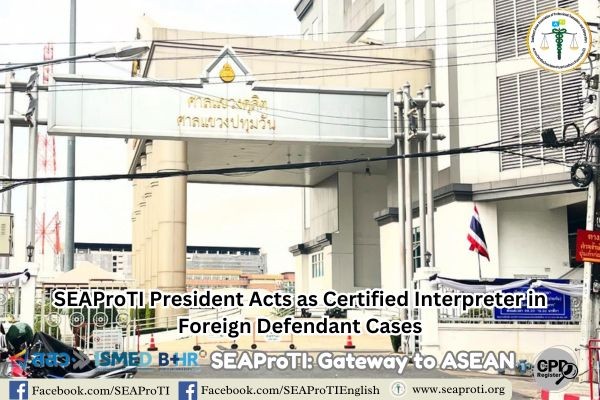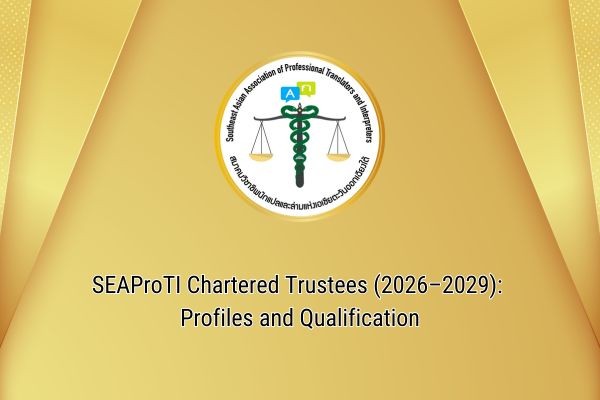English Translation in Thailand: A Compliance Imperative in Cross-Border Legal and Business Transactions
15 October 2025, This article analyzes the legal status and compliance obligations surrounding English translation in Thailand. Under Thai procedural and administrative law, translation is not merely linguistic—it is a legal act affecting the enforceability of contracts, admissibility of evidence, visa approvals, and corporate registration.
The study explains how Section 94 of the Thai Civil Procedure Code, the Ministry of Foreign Affairs (MFA) legalization process, and professional certification systems such as SEAProTI define the country’s translation governance framework.
It highlights the risks of non-compliance, including rejected court submissions, invalid commercial filings, and unenforceable agreements.
The paper concludes that translation now serves as a compliance mechanism and risk-management tool, essential for ensuring legal certainty, procedural legitimacy, and cross-border enforceability of rights in Thailand’s multilingual legal environment.
Learn how English translation in Thailand functions as a legal compliance requirement. This guide from the Southeast Asian Association of Professional Translators and Interpreters (SEAProTI) explains translation standards, MFA legalization, translator certification, and compliance risks for businesses and individuals operating across borders.
Legal Translation as Compliance, Not Convenience
In Thailand, translation is a compliance obligation, not a convenience. The Thai legal system recognizes only Thai-language documents. Thus, any English or foreign-language document must be translated, certified, and legalized to carry legal force.
Section 94 of the Civil Procedure Code explicitly bars foreign-language evidence unless accompanied by a certified Thai translation. Administrative authorities including the Department of Business Development (DBD) and Immigration Bureau—apply this rule to corporate, immigration, and judicial matters alike.
Translation as a Risk-Management Component
The rise of translation compliance stems from repeated procedural failures due to mistranslations and unqualified translators.
To prevent such errors, the Ministry of Foreign Affairs (MFA) enforces stricter control, maintaining a registry of approved translators and requiring notarization and legalization for most official documents.
Non-compliance constitutes a procedural defect, potentially invalidating corporate filings, visa applications, or legal proceedings.
- Language and legality are inseparable under Thai law.
- Documents written only in English hold no legal force unless translated into Thai.
- Thai documents used abroad require English translations to achieve recognition under foreign law.
- Translation errors can carry substantive legal consequences, altering liability, invalidating contracts, or hindering cross-border enforcement.
MFA’s Gatekeeping and Verification Role
The Department of Consular Affairs under the MFA verifies:
- The translator’s official registration or certification (for some cases).
- The accuracy and fidelity of the translation.
- The validity of notarization by licensed Notarial Services Attorneys.
Translators as Compliance Professionals
Today’s legal translators serve as compliance officers. Their certified signatures act as legal attestations of accuracy and integrity.
Professional associations such as SEAProTI (Southeast Asian Association of Professional Translators and Interpreters) uphold qualification standards, ethics, and accountability.
A case before the Singapore State Court demonstrated this professional standard when the court favored SEAProTI-licensed translators over a general translation agency for a probate case, citing reliability and adherence to codes of conduct.
Competence now requires mastery of Thai-English legal terminology, procedural law, and legalization protocols (Notarial → MFA → Embassy).
Translation Risk Across Sectors
Failure to comply with Thai translation regulations creates tangible risks:
- Immigration: Mistranslated credentials can lead to visa denials.
- Litigation: Incorrect translations can be rejected as evidence.
- Corporate Law: Ambiguous translations can invalidate shareholder resolutions or contracts.
Such risks expose parties to legal, financial, and reputational damage—especially foreign investors operating in Thailand.
Dual-Direction Translation Requirement
- English → Thai: Required for court submissions, company registration, BOI applications, and government filings.
- Thai → English: Required for international arbitration, visa and academic submissions, and cross-border litigation.
- Both require certified translators capable of producing legally defensible work in both jurisdictions.
- The integration of certified translation, MFA legalization, and SEAProTI professional oversight marks Thailand’s shift toward regulated multilingual governance.
- This ecosystem strengthens investor trust and ensures that cross-border transactions rest on linguistic accuracy and procedural legitimacy—key pillars of Thailand’s legal and commercial environment.
Translation in Thailand now operates as an infrastructure of trust—a bridge ensuring that rights, contracts, and judgments are recognized seamlessly across borders.
Engaging qualified, certified legal translators is thus a risk-mitigation strategy, not an optional service.
The Southeast Asian Association of Professional Translators and Interpreters (SEAProTI) has formally announced the qualifications and requirements for registration of Certified Translators, Translation Certification Providers, and Certified Interpreters in Sections 9 and 10 of the Royal Gazette, published by the Secretariat of the Cabinet, Office of the Prime Minister of Thailand, on 25 July 2024 (Vol. 141, Part 66 Ng, p. 100). Certified Translators, Translation Certification Providers, and Certified Interpreters
The Council of State has proposed the enactment of a Royal Decree, granting registered translators and recognized translation certifiers from professional associations or accredited language institutions the authority to provide legally valid translation certification (Letter to SEAProTI dated April 28, 2025)
SEAProTI is the first professional association in Thailand and Southeast Asia to implement a comprehensive certification system for translators, certifiers, and interpreters.
Head Office: Baan Ratchakru Building, No. 33, Room 402, Soi Phahonyothin 5, Phahonyothin Road, Phaya Thai District, Bangkok 10400, Thailand
Email: hello@seaproti.com | Tel.: (+66) 2-114-3128 (Office hours: Mon–Fri, 09:00–17:00)
บทความอธิบายว่ามาตรา 94 แห่ง ประมวลกฎหมายวิธีพิจารณาความแพ่ง ขั้นตอนการ รับรองเอกสารโดยกระทรวงการต่างประเทศ (กต.) และระบบการ รับรองนักแปลวิชาชีพโดย SEAProTI (สมาคมวิชาชีพนักแปลและล่ามแห่งเอเชียตะวันออกเฉียงใต้) มีบทบาทอย่างไรในการกำหนดมาตรฐานการแปลเอกสารในประเทศไทย พร้อมระบุถึง ความเสี่ยงจากการไม่ปฏิบัติตามกฎหมาย เช่น การถูกปฏิเสธคำร้อง การจดทะเบียนที่เป็นโมฆะ หรือสัญญาที่ไม่สามารถบังคับใช้ได้
โดยสรุป การแปลในประเทศไทยได้กลายเป็น กลไกการบริหารความเสี่ยงและการปฏิบัติตามกฎหมาย (Compliance Mechanism) ที่สำคัญ เพื่อรับรองความถูกต้องตามกระบวนการ ความชอบด้วยกฎหมาย และการยอมรับในระดับสากล
เรียนรู้ว่าการ “แปลภาษาอังกฤษในประเทศไทย” กลายเป็น ข้อบังคับทางกฎหมาย อย่างไร บทความนี้ สมาคมวิชาชีพนักแปลและล่ามแห่งเอเชียตะวันออกเฉียงใต้ ได้อธิบายมาตรฐานการแปล การรับรองเอกสารโดยกระทรวงการต่างประเทศ (กต.) การรับรองนักแปล และความเสี่ยงทางกฎหมายสำหรับธุรกิจและบุคคลที่ดำเนินกิจการข้ามพรมแดน
การแปลเอกสาร: ไม่ใช่เพียงแค่เรื่องของภาษา แต่มันคือเรื่องของกฎหมายด้วย
ในประเทศไทย การแปลเอกสารถือเป็น ข้อบังคับทางกฎหมาย ระบบกฎหมายของไทยดำเนินการโดยใช้ภาษาไทยเท่านั้น เอกสารที่ร่างเป็นภาษาอังกฤษหรือภาษาต่างประเทศอื่นใดจะต้อง แปล รับรอง และผ่านการนิติกรณ์เอกสาร (legalization) ก่อนจึงจะมีผลทางกฎหมาย
มาตรา 94 แห่งประมวลกฎหมายวิธีพิจารณาความแพ่ง กำหนดไว้อย่างชัดเจนว่า เอกสารภาษาต่างประเทศจะไม่สามารถใช้เป็นพยานหลักฐานได้ หากไม่มีคำแปลภาษาไทยที่ถูกต้องและได้รับการรับรอง ทั้งนี้ หน่วยงานราชการ เช่น กรมพัฒนาธุรกิจการค้า (DBD) และ สำนักงานตรวจคนเข้าเมือง ใช้มาตรฐานเดียวกันในทุกกรณีทางธุรกิจและกฎหมาย
การแปลเอกสารในฐานะกลไกบริหารความเสี่ยง
สาเหตุที่ประเทศไทยเข้มงวดกับการแปลเอกสารมากขึ้น มาจากปัญหาในอดีต เช่น การแปลผิด ความคลาดเคลื่อนของศัพท์กฎหมาย และการปลอมใบรับรองการแปล ซึ่งส่งผลให้เกิดการ จดทะเบียนนิติบุคคลที่ไม่ถูกต้อง และการปฏิเสธคำร้องขอวีซ่า
ปัจจุบัน กระทรวงการต่างประเทศ (กต.) จึงได้จัดทำ ทะเบียนผู้แปลที่ได้รับอนุญาตอย่างเป็นทางการ และกำหนดให้เอกสารส่วนใหญ่ต้องผ่านการ รับรองลายมือชื่อโดยทนายความ (notarization) และ การนิติกรณ์เอกสารโดยกต. (legalization)
การไม่ปฏิบัติตามขั้นตอนนี้ถือเป็น ข้อบกพร่องในกระบวนพิจารณา (procedural defect) ซึ่งอาจทำให้ธุรกรรมที่ถูกต้องในเนื้อหากลายเป็นโมฆะได้
ภาษาและกฎหมาย: ความสัมพันธ์ที่ไม่อาจแยกออกจากกัน
ในมุมมองของกฎหมายไทย “ภาษา” คือส่วนหนึ่งของ “กฎหมาย” เอกสารที่เป็นภาษาอังกฤษเพียงอย่างเดียว ไม่สามารถใช้บังคับได้ทางกฎหมาย หากไม่ได้แปลเป็นภาษาไทยโดยนักแปลที่ได้รับการรับรองในทางกลับกัน เอกสารภาษาไทยที่ต้องใช้ในต่างประเทศต้องได้รับการ แปลเป็นภาษาอังกฤษ เพื่อให้เป็นที่ยอมรับในต่างประเทศ
ข้อผิดพลาดในการแปลสามารถก่อให้เกิดผลทางกฎหมายโดยตรง เช่น
- แปลข้อความในสัญญาผิดเพียงเล็กน้อยอาจ เปลี่ยนขอบเขตความรับผิดของคู่สัญญา
- แปลชื่อหรือวันที่ผิดอาจ ทำให้สัญญาเป็นโมฆะ
- แปลคำพิพากษาศาลผิดอาจ ทำให้ไม่สามารถบังคับคดีในต่างประเทศได้
บทบาทของกระทรวงการต่างประเทศ (กต.) ในการควบคุมคุณภาพ
กรมการกงสุล กระทรวงการต่างประเทศ ทำหน้าที่เป็นหน่วยงานหลักในการตรวจสอบและรับรองการแปลเอกสาร โดยพิจารณาในประเด็นต่อไปนี้
- ความถูกต้องของเนื้อหาและถ้อยคำแปล
- ความถูกต้องของการรับรองลายมือชื่อ (notarization) โดยทนายความที่ได้รับอนุญาตจากสภาทนายความ
นักแปลในบทบาท “เจ้าหน้าที่ด้านการปฏิบัติตามกฎหมาย”
ในยุคปัจจุบัน นักแปลเอกสารทางกฎหมายไม่ได้เป็นเพียงผู้ถ่ายทอดภาษาอีกต่อไป แต่ทำหน้าที่เสมือน เจ้าหน้าที่ด้านการกำกับการปฏิบัติตามกฎหมาย (compliance officer)
ลายเซ็นของนักแปลบนคำแปลที่ได้รับการรับรอง คือ คำรับรองทางกฎหมายถึงความถูกต้องและความสุจริต องค์กรวิชาชีพอย่าง SEAProTI (สมาคมวิชาชีพนักแปลและล่ามแห่งเอเชียตะวันออกเฉียงใต้) ได้กำหนดมาตรฐานคุณสมบัติ จรรยาบรรณ และระบบความรับผิดชอบของนักแปลอย่างเป็นระบบ ตัวอย่างหนึ่งคือกรณีใน ศาลรัฐสิงคโปร์ (Singapore State Court) ที่ศาลปฏิเสธการแปลโดยบริษัทเอกชนทั่วไป และเลือกใช้ นักแปลที่ได้รับใบอนุญาตจาก SEAProTI เนื่องจากมีความน่าเชื่อถือทางวิชาชีพและปฏิบัติตามจรรยาบรรณอย่างเคร่งครัด
ความเสี่ยงจากการแปลที่ไม่ถูกต้อง
การไม่ปฏิบัติตามมาตรฐานการแปลของไทยอาจก่อให้เกิดความเสียหายร้ายแรง เช่น
- ด้านตรวจคนเข้าเมือง: การแปลผิดในใบรับรองประวัติอาชญากรรมหรือวุฒิการศึกษาอาจทำให้ วีซ่าถูกปฏิเสธ
- ด้านคดีความ: ศาลอาจ ไม่รับเอกสารแปลที่ไม่ถูกต้องเป็นพยานหลักฐาน
- ด้านธุรกิจ: การแปลข้อบังคับบริษัทหรือสัญญาผิดอาจ นำไปสู่ข้อพิพาทหรือการเพิกถอนการจดทะเบียน
- ดังนั้น “การแปลที่ผิดพลาด” ไม่ใช่เพียงปัญหาทางภาษา แต่เป็น ความเสี่ยงทางกฎหมาย การเงิน และชื่อเสียง ขององค์กรและนักลงทุนต่างชาติ
- อังกฤษ → ไทย: ใช้สำหรับการยื่นต่อศาล การจดทะเบียนบริษัท การขอวีซ่า และการติดต่อราชการ
- ไทย → อังกฤษ: ใช้สำหรับการดำเนินคดีระหว่างประเทศ การอนุญาโตตุลาการ การสมัครเรียน และการยื่นเอกสารต่อสถานทูต
ทั้งสองทิศทางต้องอาศัย นักแปลที่ได้รับการรับรองและเข้าใจกฎหมายทั้งสองระบบ
ระบบนิเวศของการแปลทางกฎหมายในประเทศไทย
ประเทศไทยได้พัฒนา “ระบบการแปลทางกฎหมาย” ที่เชื่อมโยง การรับรองการแปล (certification), การรับรองเอกสารโดยกต. (legalization) และ การกำกับมาตรฐานโดย SEAProTI เข้าด้วยกัน ระบบนี้ช่วยสร้าง ความเชื่อมั่นของนักลงทุนต่างชาติ และรับประกันว่าธุรกรรมระหว่างประเทศตั้งอยู่บนพื้นฐานของ ความถูกต้องทางภาษาและความชอบด้วยกฎหมาย
บทสรุป: การแปลเอกสารคือโครงสร้างพื้นฐานของความเชื่อมั่นทางกฎหมาย
ในประเทศไทย “การแปลเอกสาร” ได้กลายเป็น โครงสร้างพื้นฐานของความเชื่อมั่นทางกฎหมาย ที่เชื่อมโยงระบบกฎหมายของแต่ละประเทศเข้าด้วยกัน เพื่อให้สิทธิ หน้าที่ และคำพิพากษาได้รับการยอมรับโดยไม่บิดเบือน
สำหรับภาคธุรกิจ นักลงทุน และบุคคลทั่วไป การใช้บริการของ นักแปลที่มีคุณสมบัติและได้รับการรับรอง ไม่ใช่ทางเลือกอีกต่อไป แต่เป็น กลยุทธ์ในการลดความเสี่ยงทางกฎหมาย
เกี่ยวกับนักแปลรับรอง ผู้รับรองการแปล และล่ามรับรองของสมาคมวิชาชีพนักแปลและล่ามแห่งเอเชียตะวันออกเฉียงใต้
สมาคมวิชาชีพนักแปลและล่ามแห่งเอเชียตะวันออกเฉียงใต้ (SEAProTI) ได้ประกาศหลักเกณฑ์และคุณสมบัติผู้ที่ขึ้นทะเบียนเป็น “นักแปลรับรอง (Certified Translators) และผู้รับรองการแปล (Translation Certification Providers) และล่ามรับรอง (Certified Interpreters)” ของสมาคม หมวดที่ 9 และหมวดที่ 10 ในราชกิจจานุเบกษา ของสำนักเลขาธิการคณะรัฐมนตรี ในสำนักนายกรัฐมนตรี แห่งราชอาณาจักรไทย ลงวันที่ 25 ก.ค. 2567 เล่มที่ 141 ตอนที่ 66 ง หน้า 100 อ่านฉบับเต็มได้ที่: นักแปลรับรอง ผู้รับรองการแปล และล่ามรับรอง
สำนักคณะกรรมการกฤษฎีกาเสนอให้ตราเป็นพระราชกฤษฎีกา โดยกำหนดให้นักแปลที่ขึ้นทะเบียน รวมถึงผู้รับรองการแปลจากสมาคมวิชาชีพหรือสถาบันสอนภาษาที่มีการอบรมและขึ้นทะเบียน สามารถรับรองคำแปลได้ (จดหมายถึงสมาคม SEAProTI ลงวันที่ 28 เม.ย. 2568)
สมาคมวิชาชีพนักแปลและล่ามแห่งเอเชียตะวันออกเฉียงใต้ เป็นสมาคมวิชาชีพแห่งแรกในประเทศไทยและภูมิภาคเอเชียตะวันออกเฉียงใต้ที่มีระบบรับรองนักแปลรับรอง ผู้รับรองการแปล และล่ามรับรอง
สำนักงานใหญ่: อาคารบ้านราชครู เลขที่ 33 ห้อง 402 ซอยพหลโยธิน 5 ถนนพหลโยธิน แขวงพญาไท เขตพญาไท กรุงเทพมหานคร 10400 ประเทศไทย
อีเมล: hello@seaproti.com โทรศัพท์: (+66) 2-114-3128 (เวลาทำการ: วันจันทร์–วันศุกร์ เวลา 09.00–17.00 น.)


